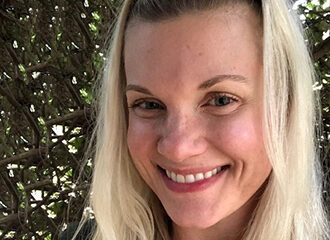Written by: Ashley Smith, M.Ed. (she/her)
Professional Relations Manager, The Renfrew Center
Everyone, at some point in their life, will experience a loss – including those recovering from an eating disorder. Whether it’s a physical loss, perceived loss, situational loss, developmental or maturational loss, necessary loss, or a combination of the above, we must wade through the sometimes-messy grief that loss leaves behind.

As a culture we tend to be uncomfortable with outward expressions of grief and, as a result, we tend to stuff down emotions until one day we can’t anymore. This could be the result of not having great road maps or examples of how to process painful thoughts, feelings, and behaviors. Instead of processing their grief with a support system or professional, individuals often walk-through life bearing the weight of all the emotions until they engage in unhealthy behaviors to avoid or relieve the pain.
Loss and grief are inevitable, and we all will experience some sort of loss over the course of our lifetime. Depending on the type of loss and what support systems an individual has in place, grief and mourning can be difficult, especially for those in recovery from an eating disorder.
How Grief Complicates Eating Disorder Recovery
Individuals may experience a loss of appetite during times of sadness, or they may turn to food for comfort. They also may become more physically active as a way of releasing unwanted anxiety and energy in the body. While none of these behaviors in and of themselves are dangerous, those who have a history of an eating disorder may be triggered by emotions associated with the grief and return to familiar ways of coping.
It’s extremely important for individuals in recovery to become their own emotional expert; to be aware of intense emotions and how to refrain from returning to less than helpful coping mechanisms.
When an individual in recovery recognizes their emotions have become overwhelming and unmanageable its best to seek support from friends, family or even professionals before it becomes problematic. Whether it’s an outpatient team or eating disorder treatment (Day Treatment, Intensive Outpatient or Residential levels of care), help is available, and you do not have to grieve alone.
Loss, Grief and Mourning – What’s the difference?
Loss is an inevitable part of life. While most people associate grief with death, grief also can be the result of a variety of losses or drastic changes.
Examples of loss can include:
• Death of a friend, family member or loved one
• Loss of independence
• Serious health complications or illness
• Broken relationships
• Miscarriage
• Loss of a job or career
• Loss of financial security/stability
• Loss of dreams or aspirations
Grief is simply a natural response to loss. It’s all the emotions you experience when you experience a loss. These emotions can include:
• Fearfulness
• Loneliness and depression
• Anxiety and panic
• Pain and sadness
• Yearning
• Resentment
• Emptiness and numbness
• Anger and frustration
Remember, while emotions themselves are not harmful, it is important to be mindful of potential destructive behaviors that can occur while experiencing intense and often complicated emotions.
Mourning is the outward expression of grief. While there aren’t any “right” or “wrong” ways to mourn, there are types of mourning that are healthier than others.
Adaptive or healthy ways to mourn can include:
• Talking to friends or family
• Seeking therapy services with a mental health professional
• Resting and reflecting
• Crying
• Getting fresh air and connecting with nature
• Joining a support group
• Journaling or letter writing
• Creating art or music as a means of expressing their grief
• Finding pleasure in mindful movement or play
• Storytelling
Maladaptive or unhealthy ways to mourn can include:
• Repeatedly seeking comfort through food, or restricting intake
• Abusing alcohol or other substances
• Isolating from friends or family
• Engaging in risky behaviors
• Self-harming
• Avoiding social situations or things you enjoy doing
• Staying busy or over-working
Remember, what works for others, may not work for you.
Grieving the Loss of Your Eating Disorder
To make the grieving process even more complicated, it is common for those in treatment and recovery to feel deep grief over the loss of their eating disorder. Most individuals state their eating disorder provided some sort of purpose or helped them cope with life when they needed it most.
When life was difficult and they experienced intense negative emotions, the eating disorder provided a perceived safety net. So, giving up that coping mechanism that helped support them through difficult times might seem silly and unnecessary. However, it’s important for individuals in treatment and throughout recovery to grieve the loss of their eating disorder and build a more healthy, integrated identity that can support a fulfilling life.
Conclusion
Our hope is to provide a structure for recognizing loss when it happens, identifying the grief and other emotions experienced because of the loss and provide more adaptive ways to mourn. At The Renfrew Center, we understand the difficulties of struggling with both an eating disorder and grief, as it can feel overwhelming and unmanageable. Please know, that support is available, and you are worthy of it. Reach out to us at 1-800-RENFREW to get started with an assessment.



